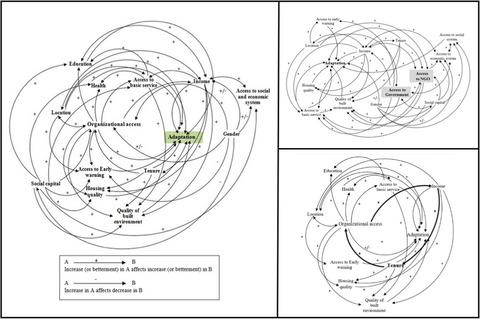Our official English website, www.x-mol.net, welcomes your
feedback! (Note: you will need to create a separate account there.)
Adaptation to flooding in low‐income urban settlements in the least developed countries: A systems approach
The Geographical Journal ( IF 3.6 ) Pub Date : 2020-06-10 , DOI: 10.1111/geoj.12348 Anika Nasra Haque 1 , Mike Bithell 1 , Keith S. Richards 1
The Geographical Journal ( IF 3.6 ) Pub Date : 2020-06-10 , DOI: 10.1111/geoj.12348 Anika Nasra Haque 1 , Mike Bithell 1 , Keith S. Richards 1
Affiliation

|
This study aims to use a whole systems approach (1) to understand the processes of adaptation to flooding of the urban poor; (2) to identify new knowledge of how low‐income settlements might better adapt to climatic risks; and (3) to begin to develop appropriate guidance on this. Low‐income urban settlements in the least developed countries (LDCs) present an extreme case where catastrophic natural hazards and chronic social hazards overlap. These low‐income urban populations face the greatest adaptation challenges as they often occupy informal settlements that are particularly exposed to hazards, and have multiple vulnerabilities arising from their lack of basic services. There is a dynamic complexity of issues arising from the many levels of actor involved and multiple social and physical factors. Analysing such a complex phenomenon calls for a specific conceptual framing, and a systems theory approach is suggested to provide a holistic perspective. The case study for this research is located in Dhaka East, where there is both high vulnerability to flooding, and a significant low‐income population. The research has adopted a mixed methods approach involving different data collection methods governed by the different scales and actors being investigated. The research develops new systems understandings of perceptions and experiences of the local population about adaptation processes in low‐income urban settlements, and how these processes may be positively influenced by integrating bottom‐up and top‐down approaches.
中文翻译:

适应最不发达国家低收入城市住区的洪水:一种系统方法
本研究旨在使用整体系统方法 (1) 来了解城市贫民对洪水的适应过程;(2) 确定低收入住区如何更好地适应气候风险的新知识;(3) 开始为此制定适当的指南。最不发达国家 (LDC) 的低收入城市住区是灾难性自然灾害和慢性社会灾害重叠的极端情况。这些低收入城市人口面临着最大的适应挑战,因为他们经常居住在特别容易受到灾害影响的非正式住区,并且由于缺乏基本服务而存在多种脆弱性。所涉及的行为者的多个层面以及多种社会和物理因素导致问题的动态复杂性。分析如此复杂的现象需要特定的概念框架,建议采用系统理论方法来提供整体视角。本研究的案例研究位于达卡东部,那里对洪水的脆弱性很高,而且低收入人口众多。该研究采用了一种混合方法,涉及受调查的不同规模和参与者控制的不同数据收集方法。该研究开发了对当地人口对低收入城市住区适应过程的看法和经验的新系统理解,以及如何通过整合自下而上和自上而下的方法对这些过程产生积极影响。本研究的案例研究位于达卡东部,那里对洪水的脆弱性很高,而且低收入人口众多。该研究采用了一种混合方法,涉及受调查的不同规模和参与者控制的不同数据收集方法。该研究开发了对当地人口对低收入城市住区适应过程的看法和经验的新系统理解,以及如何通过整合自下而上和自上而下的方法对这些过程产生积极影响。本研究的案例研究位于达卡东部,那里对洪水的脆弱性很高,而且低收入人口众多。该研究采用了一种混合方法,涉及受调查的不同规模和参与者控制的不同数据收集方法。该研究开发了对当地人口对低收入城市住区适应过程的看法和经验的新系统理解,以及如何通过整合自下而上和自上而下的方法对这些过程产生积极影响。该研究采用了一种混合方法,涉及受调查的不同规模和参与者控制的不同数据收集方法。该研究开发了对当地人口对低收入城市住区适应过程的看法和经验的新系统理解,以及如何通过整合自下而上和自上而下的方法对这些过程产生积极影响。该研究采用了一种混合方法,涉及受调查的不同规模和参与者控制的不同数据收集方法。该研究开发了对当地人口对低收入城市住区适应过程的看法和经验的新系统理解,以及如何通过整合自下而上和自上而下的方法对这些过程产生积极影响。
更新日期:2020-06-10
中文翻译:

适应最不发达国家低收入城市住区的洪水:一种系统方法
本研究旨在使用整体系统方法 (1) 来了解城市贫民对洪水的适应过程;(2) 确定低收入住区如何更好地适应气候风险的新知识;(3) 开始为此制定适当的指南。最不发达国家 (LDC) 的低收入城市住区是灾难性自然灾害和慢性社会灾害重叠的极端情况。这些低收入城市人口面临着最大的适应挑战,因为他们经常居住在特别容易受到灾害影响的非正式住区,并且由于缺乏基本服务而存在多种脆弱性。所涉及的行为者的多个层面以及多种社会和物理因素导致问题的动态复杂性。分析如此复杂的现象需要特定的概念框架,建议采用系统理论方法来提供整体视角。本研究的案例研究位于达卡东部,那里对洪水的脆弱性很高,而且低收入人口众多。该研究采用了一种混合方法,涉及受调查的不同规模和参与者控制的不同数据收集方法。该研究开发了对当地人口对低收入城市住区适应过程的看法和经验的新系统理解,以及如何通过整合自下而上和自上而下的方法对这些过程产生积极影响。本研究的案例研究位于达卡东部,那里对洪水的脆弱性很高,而且低收入人口众多。该研究采用了一种混合方法,涉及受调查的不同规模和参与者控制的不同数据收集方法。该研究开发了对当地人口对低收入城市住区适应过程的看法和经验的新系统理解,以及如何通过整合自下而上和自上而下的方法对这些过程产生积极影响。本研究的案例研究位于达卡东部,那里对洪水的脆弱性很高,而且低收入人口众多。该研究采用了一种混合方法,涉及受调查的不同规模和参与者控制的不同数据收集方法。该研究开发了对当地人口对低收入城市住区适应过程的看法和经验的新系统理解,以及如何通过整合自下而上和自上而下的方法对这些过程产生积极影响。该研究采用了一种混合方法,涉及受调查的不同规模和参与者控制的不同数据收集方法。该研究开发了对当地人口对低收入城市住区适应过程的看法和经验的新系统理解,以及如何通过整合自下而上和自上而下的方法对这些过程产生积极影响。该研究采用了一种混合方法,涉及受调查的不同规模和参与者控制的不同数据收集方法。该研究开发了对当地人口对低收入城市住区适应过程的看法和经验的新系统理解,以及如何通过整合自下而上和自上而下的方法对这些过程产生积极影响。











































 京公网安备 11010802027423号
京公网安备 11010802027423号